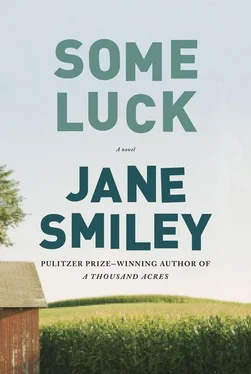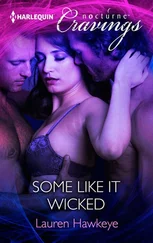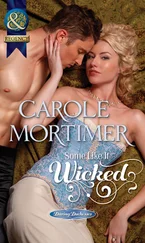LILLIAN AND ARTHUR’S NEW HOUSE had two stories, in Woodley Park. There were three bedrooms, and they had fashioned a nursery for little Debbie out of the big closet in their room, so, when he visited, Frank had the back of the house to himself. He was almost asleep when he awoke with a violent start to find Arthur standing above him.
“Don’t shoot me,” whispered Arthur.
“I’m not armed,” grumbled Frank.
“You wouldn’t bring a gun into a house with children.”
“I have,” said Frank, “but not this time.”
Arthur sat on the bed. The fluorescent hands on the clock read a quarter past midnight. Frank wiggled his shoulders, stilled his breathing, and sat up. Arthur offered him a cigarette and said, “Let’s go for a walk.”
Frank threw off the covers. Going for a walk with Arthur was always interesting.
They went down the stairs and out the kitchen door, which opened onto a nicely fenced yard (the reason they had chosen this house) and an alley (the other reason they had chosen this house — Arthur always liked an escape route). They turned right down the alley, toward a less traveled and not very well-lit cross street. Arthur paused once to look at the house. The light above the kitchen porch was on, but every other window was dark. The outdoors was a symphony of summer odors — dust and grass, roses. Layered under this was auto exhaust and fertilizer — Arthur’s neighborhood was full of ambitious lawns.
It took Arthur about half a block to stop talking about the kids (Debbie was such a good sleeper, and Timmy was climbing the stairs and going right back down — he was careful but bold, a perfect combination) and ask Frank if he wanted to be fixed up with someone, a nice girl about his own age, good figure, said to be lots of fun, and fairly well known to be fast. “Who does she work for?” said Frank.
“She draws her paycheck from Justice. Who she works for is for you to find out.”
“Is that right?” said Frank, in a tone of satisfaction.
“It’s just a hunch,” said Arthur, “and you’re the man to follow it out. What happened was, last month, George Kennan was driving down U Street, and he had to stop for the streetcar at Fourteenth. A guy who got off the streetcar was someone he knew, a fellow from the Soviet embassy to the United Nations, named Valentin Gubitchev. These days, he works for the UN, as a translator, I think. Kennan recognized him and wondered what he was doing in D.C. He followed the streetcar down Fourteenth. A woman got off at Pennsylvania that Kennan thought he recognized, and when he got home, he realized that he did recognize her as someone he’d seen at the Justice Department. He even remembered her boss. So he sent her boss a message referring to a newly discovered source of uranium in Tunisia, a place where there is no uranium, and pretty soon, our own agents were picking up attempts on the part of the Soviets to find out who was mining uranium in Tunisia. She had handed it over. There was no other way for them to get that information.”
Frank laughed. They had come to a park, and Arthur turned right along the sidewalk that skirted the darkness of the grass and trees.
“All you have to do is date her for a while. There is no reason for this girl to be a spy. She has no history of communist sympathies. Is she sleeping with this Russian guy? Is she giving him stuff because she’s sleeping with him, or is he sleeping with her because she’s giving him stuff? Or what? I’m telling you, it’s like, if this girl can be a spy, then anyone can be a spy. We got plenty of suspicious characters who did this or that in the thirties and through the war, and believed something or other. But this gal, she has no reason at all.”
“Arthur, am I being hired?”
“No, Frank. You are exercising your favorite hobby. You like pretty girls. Pretty girls like you. And I am curious. The thing is, guys that I work with are always running out and doing crap. Hillen-koetter will be a sitting duck for these guys. They want to start a war in Greece, they want to start a war in Italy. They believe everything they hear, as long as it gives them a reason to start a war. I’m not saying old Joe Stalin isn’t a bastard. I’m not saying there aren’t spies everywhere and commies in every broom closet — maybe there are. But if I knew something, I could do something.”
“But you don’t know what.”
“But I don’t know what.”
Monday morning, Frank sent a telegram to his boss in Dayton, saying that he was down with the flu and would be home in a week. The girl’s name was Judy — Frank wouldn’t let Arthur tell him the last name — and the only other thing he knew about her was what she looked like (Arthur gave him a copy of her Justice Department ID photo). Frank followed her for two days, at such a distance that he started having the feeling that he was going to shoot her. He found out where her apartment was (Georgetown), where she shopped for groceries (not far from Lillian’s), where she shopped for shoes, where she bought cigarettes and magazines. He followed her to a movie ( Life with Father ), and saw that no one met her there. She met someone for a drink, but afterward they went their separate ways. She turned out her bedroom light at half past ten on Monday, ten after eleven on Tuesday. She left her apartment building at 7:47 a.m. on Tuesday, and eight on the dot on Wednesday. Most important, she ate lunch at the same spot on Monday and Tuesday — on a bench to the west of the Navy Memorial. Frank was there when she arrived on Thursday, sitting with his egg-salad sandwich and his devil’s-food cupcake and his Pepsi (she liked Pepsi). She paused for a moment, then, evidently deciding that he was harmless, sat down at the other end of the bench.
He gave her a sidelong glance. Up close, she was more buxom than he’d thought. Her face was one of those that looked plain sometimes and pretty sometimes. His assessment was that he was better-looking than she was, so he turned and gave her a big smile. She moved her handbag closer to her hip. He said, “Thanks.”
She didn’t say anything. He relaxed against the back of the bench, and pretended to doze off. She then relaxed, too, and began to eat her sandwich. She also had an apple — a pippin, Frank thought, from the rough skin. Four or five people passed — how many Frank couldn’t really tell, once his eyes were closed. He counted down — three, two, one — and then sat up, looked at his watch, muttered, “Oh, damn!” He leapt from the bench and ran toward 7th Street. His wallet fell from his pocket, and landed on the grass in front of the bench. As he disappeared around the corner of the Navy Memorial, he heard her shout, “Hey! Hey, you!” He peeked back at her just long enough to see that she was standing there with her arm out, holding his wallet in the air. Then, thinking he was gone, she opened it. Frank turned away. Part of the pleasure in this was seeing what she would do now.
He had put $113 in it — enough for someone who had a job and a non-criminal life, perhaps especially a woman, to hesitate over keeping. It also had the driver’s license supplied to him (Francis Burnett) by Arthur, a library card, and an empty addressed envelope (with a list of groceries on the back) that had Arthur and Lillian’s address on it. Arthur and Lillian were taking Timmy and Debbie to Charlottesville to visit his father. The house was his for two days.
She showed up about six. It was dark, and Frank had left the porch light on. He also made sure that the chair where he had been “reading a book” was well lit, that his martini was sitting on the side table beside the chair, that — a wonderful touch, in Frank’s opinion — chicken soup had been warmed on the range. He came to the door in bare feet, with his shirt unbuttoned at the collar and his sleeves rolled up. Just before he opened the door, he ran his hand through his hair. When he opened the door and said, “Yes?” he beamed at her. She could not help smiling back. She held out his wallet. He took it, did not open it, said, “You were sitting on the bench! I noticed you. You were worried I’d steal your bag.”
Читать дальше












